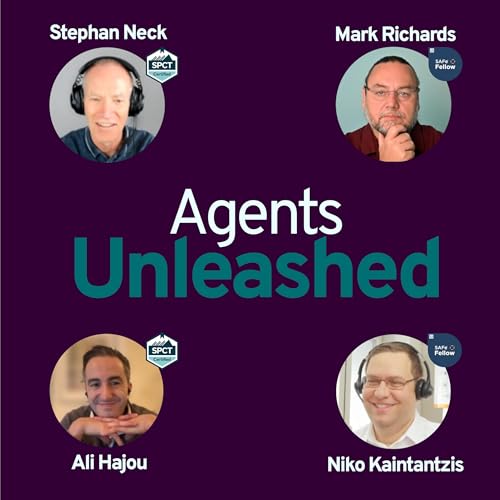
Agents Unleashed
カートのアイテムが多すぎます
カートに追加できませんでした。
ウィッシュリストに追加できませんでした。
ほしい物リストの削除に失敗しました。
ポッドキャストのフォローに失敗しました
ポッドキャストのフォロー解除に失敗しました
-
ナレーター:
概要
Agents Unleashed is a podcast for curious change agents building the next generation of adaptive organizations — where people and AI learn, work, and evolve together.
Hosted by Mark Richards, Ali Hajou, Stephan Neck, and Nikolaos Kaintantzis, the show blends stories from the field with experiments in agility, leadership, and technology. We explore how work is changing — from agile teams to agentic ecosystems — through honest conversation, a dash of mischief, and the occasional metaphor that gets away from us.
We’re not selling frameworks or chasing hype. We’re practitioners figuring it out in real time — curious, hopeful, and sometimes hilariously wrong.
Join us as we unpack what it really means to be adaptive in a world where intelligent agents (human and otherwise) are rewriting the rules of change.
-
 57 分
57 分カートのアイテムが多すぎます
ご購入は五十タイトルがカートに入っている場合のみです。カートに追加できませんでした。
しばらく経ってから再度お試しください。ウィッシュリストに追加できませんでした。
しばらく経ってから再度お試しください。ほしい物リストの削除に失敗しました。
しばらく経ってから再度お試しください。ポッドキャストのフォローに失敗しました
ポッドキャストのフォロー解除に失敗しました
-
 1 時間 2 分
1 時間 2 分カートのアイテムが多すぎます
ご購入は五十タイトルがカートに入っている場合のみです。カートに追加できませんでした。
しばらく経ってから再度お試しください。ウィッシュリストに追加できませんでした。
しばらく経ってから再度お試しください。ほしい物リストの削除に失敗しました。
しばらく経ってから再度お試しください。ポッドキャストのフォローに失敗しました
ポッドキャストのフォロー解除に失敗しました
-
 58 分
58 分カートのアイテムが多すぎます
ご購入は五十タイトルがカートに入っている場合のみです。カートに追加できませんでした。
しばらく経ってから再度お試しください。ウィッシュリストに追加できませんでした。
しばらく経ってから再度お試しください。ほしい物リストの削除に失敗しました。
しばらく経ってから再度お試しください。ポッドキャストのフォローに失敗しました
ポッドキャストのフォロー解除に失敗しました


